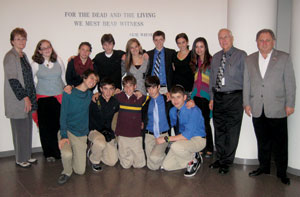Israelis agree: Protect our country
I was recently reading a book that reminded me about my first days in the United States. It’s about a group of exceptional women in Liberia who decided to do anything in their power to stop the massacre and the civil war that ultimately destroyed the country. They forced both sides to peacefully stop the bloodshed and start peace negotiations. One of them wrote an amazing book about her journey, in which she tried to explain to Westerners what she had been through. As you can imagine, a big part of her journey was living under the reign of terror.
You might wonder how her life and experiences in war-torn Liberia had anything to do with me, who comes from a progressive, first-world country. As I began planning my work here, I thought of ways to try and explain what happened in Sderot, Israel — a significant and war-torn part of my life — to American ears. As I thought it through, I began to understand so many things that I just couldn’t see in all my years in Israel. I understood how abnormal the situation in Israel is, how far away it is from anything people in the United States or Europe experience in daily life.
And I understood that Liberian woman well.
While Israel is not Liberia, it is a strong, democratic country that can defend itself well. You see more people dead in the streets of New York than you would in Israel. That said, Israelis constantly live in fear of annihilation, and everything we do is focused on preventing our demise.
Can you imagine living your life in constant alert? Every bag that was left on the street is a potential bomb; every suspicious man that gets on the bus is a potential suicide bomber; and every breaking news alert is a potential war. Unfortunately, we are not neurotic or paranoid for nothing.
There are many good things in Israel, lately the attempt is to talk and mention only technological achievements — to show other sides of Israel. I think it’s important, because every Jew can be proud in the state of Israel for that matter, but one needs to know more aspects of Israeli life in order to truly understand why we think and act the way we do. The outside perspective — mostly drawn from watching world news and the public relations Israeli companies are doing to promote Israel’s technological achievements — is not enough for a complete understanding. There are all kinds of truths about Israel, and this is one of them: in Israel there are children who decide where to play based on proximity of the playground to the bomb shelter. These same children know only a reality in which rockets are constantly fired on their homes and schools. For these children, no place is safe, and everyone — even children — must be brave all the time. Many of them become adults overnight. In order to understand that reality, one needs to ask: What if it was me? If those were my kids? My grandkids?
For at least 64 years, the Israelis have faced a harsh reality, and we continue to stand proud in spite of it all. It makes all of us stronger in many ways. We love our country and believe in our just cause. We may not always agree on how to protect it — both the left and the right in Israel believe in what they are doing to ensure the longevity of a Jewish state. So we continue to discuss and debate whether the best way to protect Israel is to sign a peace agreement with the Palestinians right now or to be more suspicious about making peace with this same group. But we all agree that we must protect our country. I guess that’s what any of us would feel when fighting to defend our homes.
This is not an advocacy article; there is no propaganda here. This is a mere testimony of my experiences, and an attempt to give you one more point of view of how people in Israel think.



 What are monsters? In storybooks they frequently emerge as strong, wicked, mysterious beings whose purpose is to do harm. In movies, they sometimes look like huge, frightening creatures dripping with venom. In real life, monsters appear as … Oh, wait. They don’t. When we’re young, we’re taught that monsters exist only in stories and fairytales. And, of course, it’s not logical to fear something that isn’t real. I grew up believing that monsters live only where they belong, in books and myths. My experiences as a participant in the Together We Remember program, turned that notion upside down. What I learned is that monsters can in fact become a very real threat to humanity.
What are monsters? In storybooks they frequently emerge as strong, wicked, mysterious beings whose purpose is to do harm. In movies, they sometimes look like huge, frightening creatures dripping with venom. In real life, monsters appear as … Oh, wait. They don’t. When we’re young, we’re taught that monsters exist only in stories and fairytales. And, of course, it’s not logical to fear something that isn’t real. I grew up believing that monsters live only where they belong, in books and myths. My experiences as a participant in the Together We Remember program, turned that notion upside down. What I learned is that monsters can in fact become a very real threat to humanity. “I go to Grandma and Grandpa Brown’s for Christmas, help trim the tree, sing carols and then get a lot of presents. And then we go to Grandma and Grandpa Friedman’s to light the Chanukah candles, bake Chanukah cookies and get presents for eight nights,” bragged Josh Solomon, age 6, of New York City to one of his first-grade friends. “That’s not fair,” his friend responded, “I only get presents on one day.”
“I go to Grandma and Grandpa Brown’s for Christmas, help trim the tree, sing carols and then get a lot of presents. And then we go to Grandma and Grandpa Friedman’s to light the Chanukah candles, bake Chanukah cookies and get presents for eight nights,” bragged Josh Solomon, age 6, of New York City to one of his first-grade friends. “That’s not fair,” his friend responded, “I only get presents on one day.”